
These days, it seems like everyone’s running the subscription business model – even car washes.
And they’re stirring up more than just occasional consumer complaints. Cities and municipalities are in an uproar because more and more of these businesses are springing up in smaller towns. Aside from using up a lot of land, they create few jobs.
In spite of the critics, Bloomberg reports automated car washes are now a $14 billion industry, a market predicted to double by 2030. In fact, these businesses have become so profitable, private equity has jumped in with both feet. And they’re another example of a business vertical that’s been reinvented by monthly subscription packages.
That’s no surprise. We’ve been talking about the “subscription economy” for years now. First, it was Sirius and XM, the two satcasters that originated the pay-for-content-monthly wave as we’ve come to know it. Later, Netflix revolutionized the way we watch TV with their well-known subscription model, still leading the way today.
The floodgates are wide open. A recent Forbes Home study reports the average U.S. household has nearly three media subscriptions, now paying roughly $46 per month for content. As you might expect, many have become disgruntled with those economics. We’ve been tracking subscription dissatisfaction levels in Techsurvey for several years now, and the further we get from the pandemic, the more consumers express concern: We’ve now hit an all-time high – or low – as three in four core radio listeners are not the least bit copacetic with their content subscription burden:
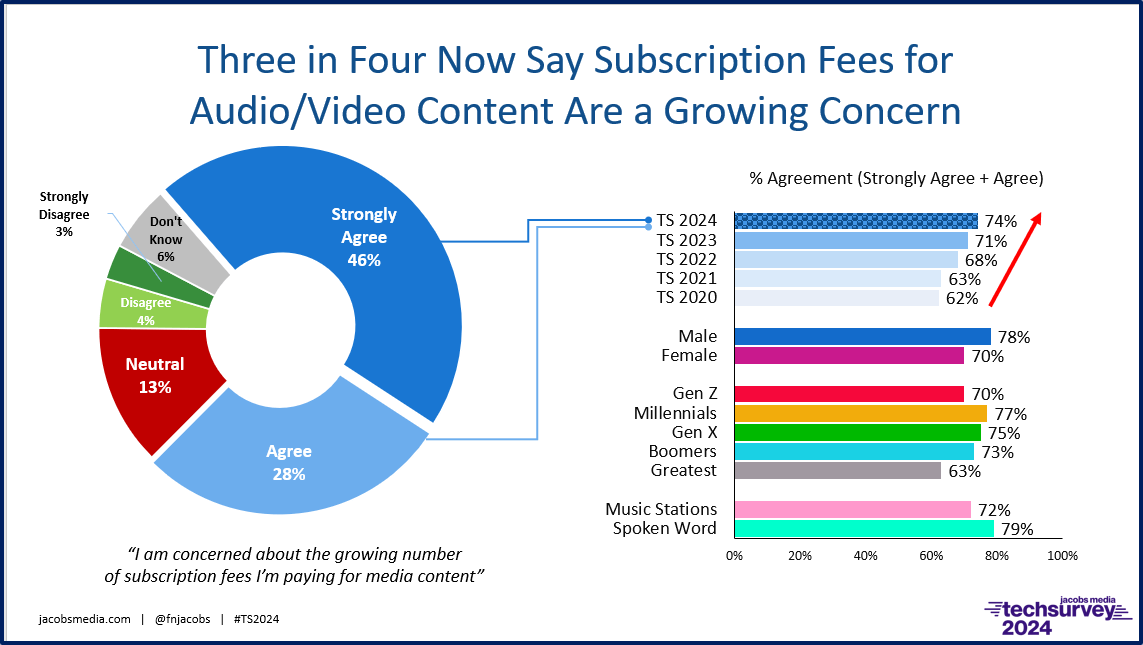
Into the fray steps Tubi. If you haven’t heard about this free streaming television service, you will. A story that ran last week in the LA Times by Stuart Battaglio charts Tubi’s impressive run.
By taking the contrarian approach to video streaming with an ad-supported service, last month Tubi hit the 1 million viewer threshold. Not only is that a year-over-year spike for Tubi, but the upstart passed Disney+, Peacock, Max, and Paramount+.
As Battaglio points out, “In the era of ‘streamflation,’ it’s good to be Tubi.”
Indeed. Tubi’s unconventional approach comes at just the right time for consumers looking for something to watch on TV, but fed up with having to pay for it.
At a time when ad sales for media brands are generally puny industry-wide, Tubi is bucking that trend. Their viewership is also young – a median age of just 39 years-old – and it’s also more diverse. And Tubi is doing it with a wide spread of content offerings hitting all sorts of genres and subgenres, including Blaxploitation, to set them apart from other nondescript video streaming brands.
But it’s the word “free” that is the keyword in Tubi’s marketing. More often they lead with it in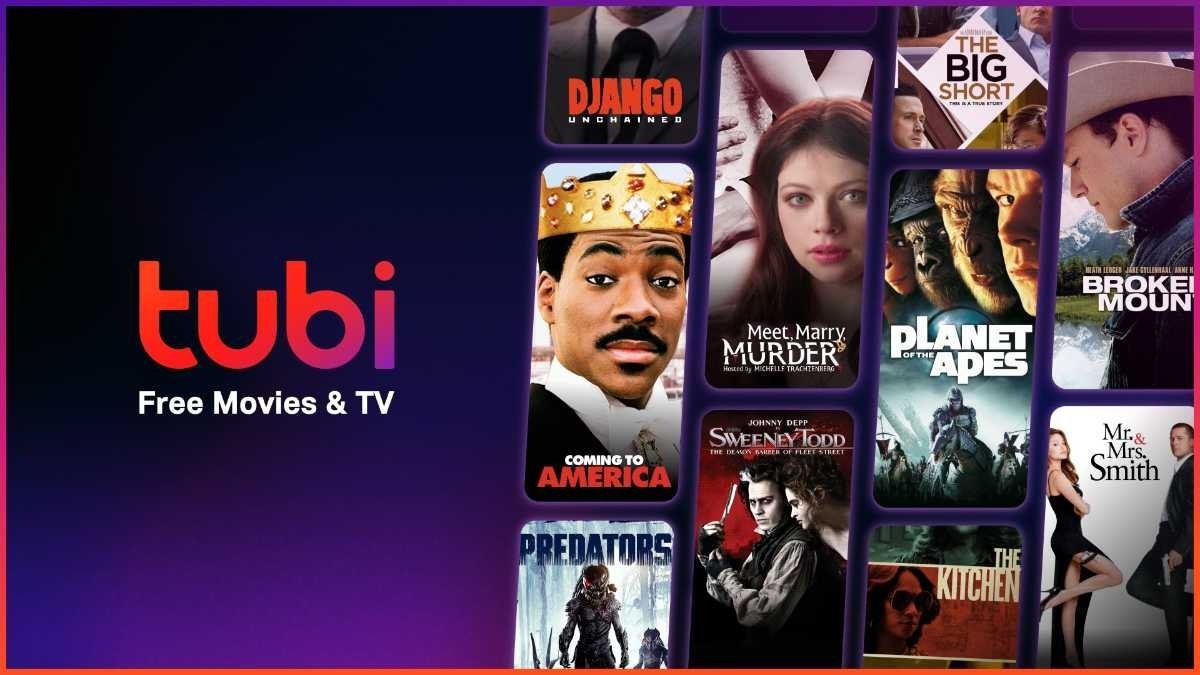 their ads and promos.
their ads and promos.
Or using “free” in a clever slogan like:
“You free tonight? Because we are.”
Interestingly, the Tubi community boasts lots of cord-cutters, but also “cord-nevers” – folks who have never shelled out money to subscribe to content. Tubi is just what their budget ordered, and watching on-demand turns out to be where 90% of viewing originates. In many ways, Tubi is giving “everybody else” somewhere to go.
And they’re doing it with dash and style. Consider these outdoor ads Tubi ran a few years back in large U.S. markets:
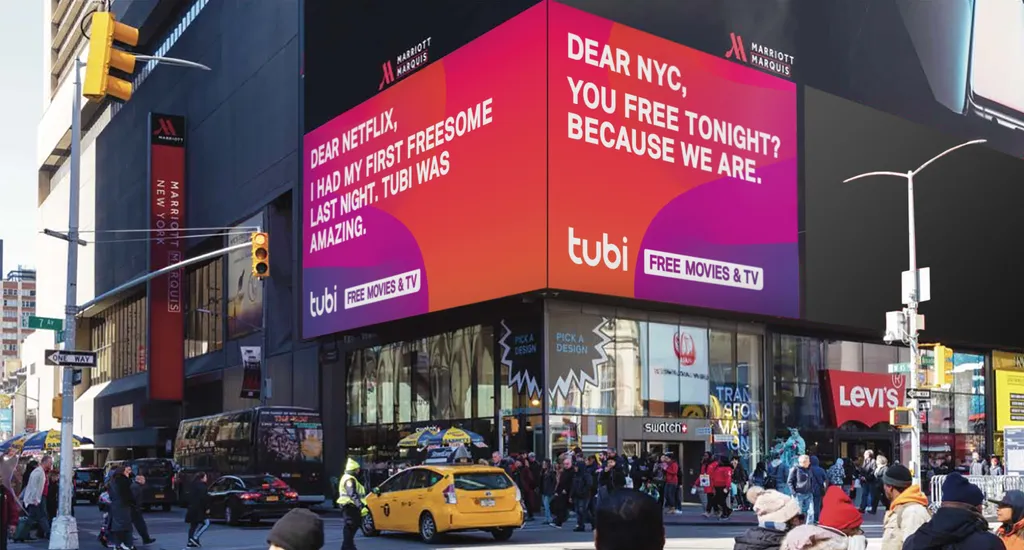
Which brings us to radio – broadcast radio, that is. The analogies with Tubi are numerous and compelling. As we see every year in Techsurvey, the fact radio is free is one of the top two reasons why core listeners love the medium.
Right alongside “easiest to listen to in the car,” radio’s “free” status emerges as a strategic “steel sword” that separates AM/FM from most audio entertainment formats. The problem is, we keep that weapon in our sheaths.

How big is “free?” So big that two-thirds of radio’s heaviest users cite the free price tag as a main reason why they continue to tune in. That’s a 7-year high, thanks in no small part to the backlash toward media subscriptions so many are now feeling.
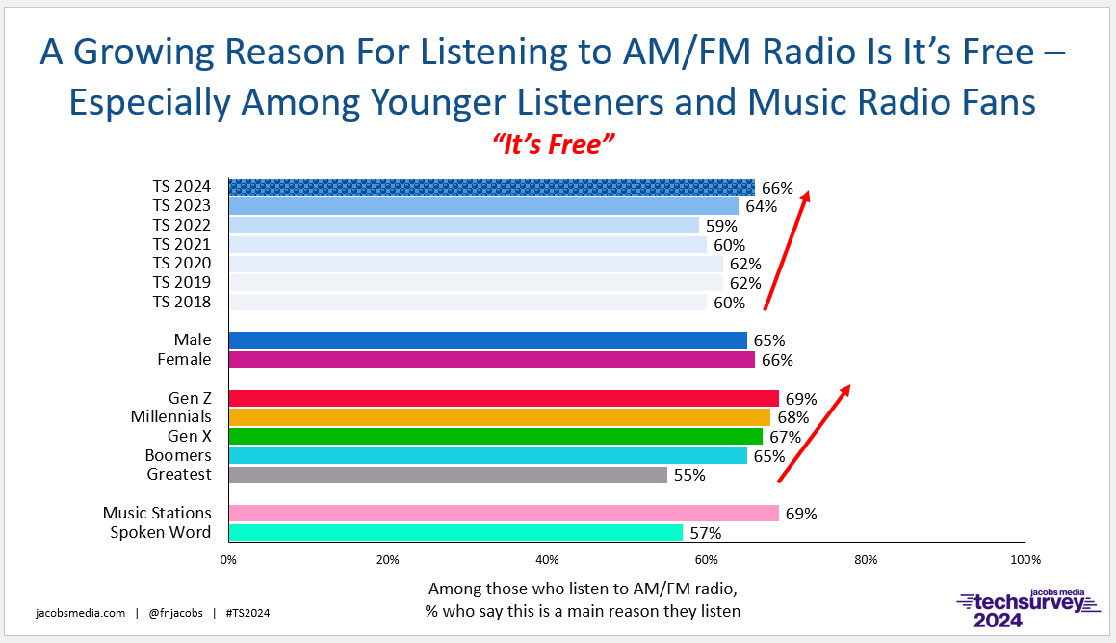
You also can’t ignore the generational appeal of “free,” a finding that syncs up with the reality Tubi is appealing to a much younger audience than the usual tired network programming.
Tubi exuded its brash attitude during last year’s Super Bowl when they used the game itself to pull off what looked like a “takeover,” again drawing attention to their difference:
It takes vision – along with some pluck and attitude – to pull off Tubi’s accomplishment. But by swimming upstream and realizing how many consumers are dropping video subscription services, Tubi is able to grow its audience while attracting bigger and bigger names to their own original productions.
In a world of relative sameness – most people are confused by which shows and movies are on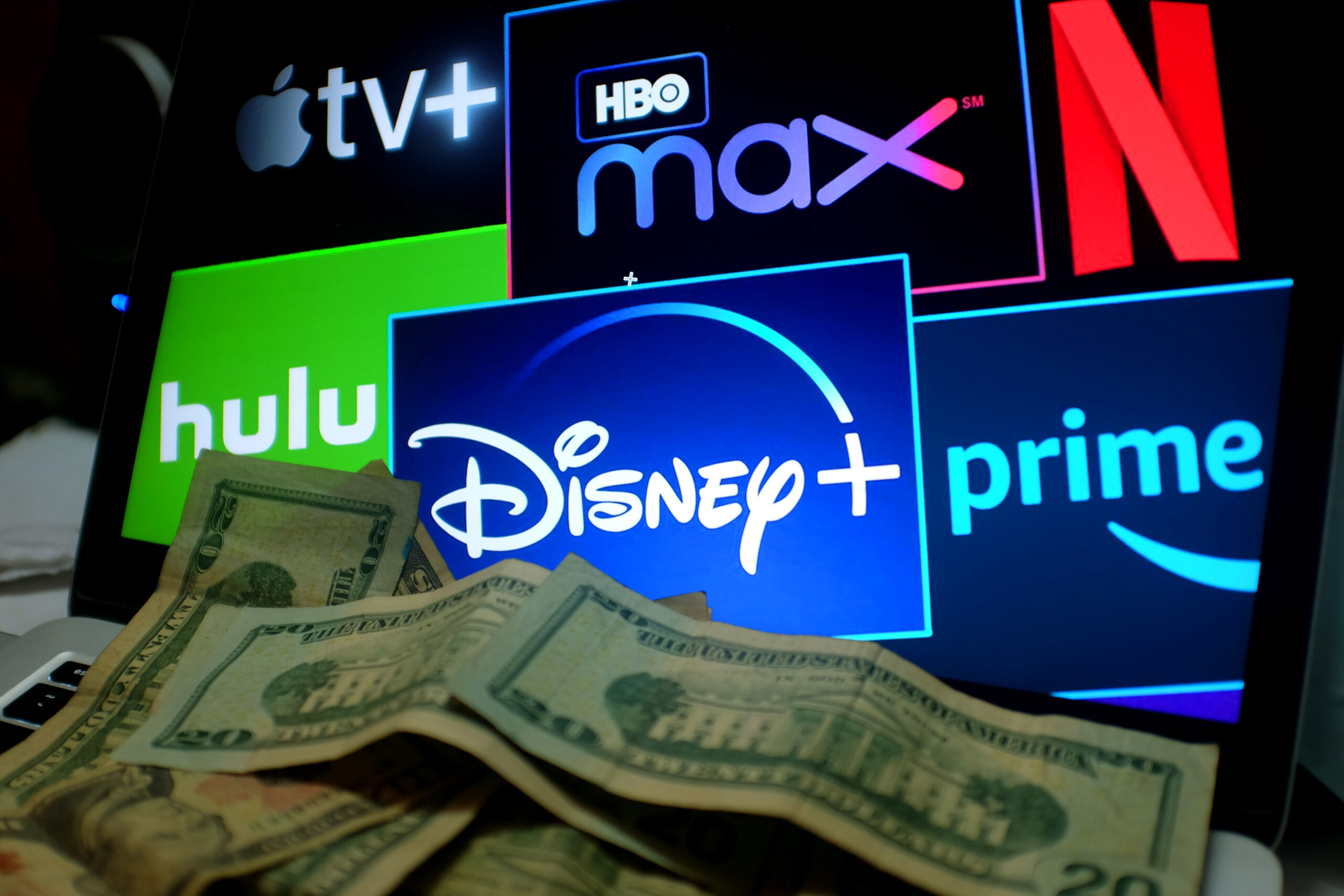 which DSPs. And can you really tell them apart from each other? Tubi’s unique differences are a big reason why they stand out from the pack.
which DSPs. And can you really tell them apart from each other? Tubi’s unique differences are a big reason why they stand out from the pack.
A segue over to radio’s existential struggles as a viable medium up against deep-pocketed global media and technology mammoths suggests a different strategy. Perhaps a prime component is “free,” but also with an honest effort to declutterize the sound of most stations, and taking a machete to the commercial load.
How can a legacy player like radio mash up its inherent strengths with its environmental advantages in a media landscape that’s gotten confusing, cluttered, and yes, expensive?
As Tubi has tapped into communities with different tastes and priorities as well as those who are subscription averse, they have done more than just carved out a position. Tubi has created its own category.

Seems to me, radio did that a long time ago.
- Will Radio Jump On TikTok’s “Silver Express?” - May 27, 2025
- Memorial Day 2025 – The Year Of Standing On Shaky Ground - May 23, 2025
- To Win In Radio, Make A Difference - May 22, 2025




Tubi is a great find. So is Pluto, which has a bunch of movie channels, most of the choices are forgettable but I usually find a gem or two. Yep, with commercials. People my age grew up with commerical TV so it’s not a big deal to me. It doesn’t appear to be an issue for younger viewers, either. Yes, Tubi and Pluto are free and yes, they have commercials. My impression is the breaks – as well as the commercial units – are shorter. Maybe two minutes total, instead of the 4 – 6 – 8 minute or more on commercial radio. To me, that should be radio’s takeaway.
I was actually going to mention Pluto myself. There’s indeed an industry category for such services: “FAST” (for “free ad-supported streaming television”).
I also stumbled across this very good, recent THR profile of the sector…
https://www.hollywoodreporter.com/business/business-news/fast-streaming-pluto-roku-tubi-1235911138
Right on target, Fred. As usual. Who knows, maybe competition from Tubi and Pluto will put some downward pressure on the pay-for streamers–whose customer I happily remain, at least for the foreseeable future.
It has been wisely observed that if a service is free then you are the product. More specifically, your attention is. Perhaps it’s just an effect of getting older that you value your time and attention more highly than they do, and you more likely can afford to “buy” it through a paid subscription.
And yet I still listen to commercial OTA radio nearly as much as I do other audio sources. Because “free” isn’t radio’s only virtue.
I love to Tubie lately I’ve been thinking about marketing and that all these businesses are making money and the reason of prices to go up and making rent go up too. It makes no sense that they keep building new condominiums really expensive but people can’t even afford them .and grocery stores and various different items go up as well it’s nice to know that I can count on Tubie because they care about people and their expenses. Even going to the doctors takes money it’s difficult to know if they care or not because at the end of the day they’re making a profit. operations like fast food joints it’s hard to know if they care either because a lot of the products I think have a lot of addictive chemicals in it so it’s making it even harder for people to say no to it. But one thing for sure I know I’ll always be thankful for to Tubie
The only issue I have is there is still geolocked content on tubi, there is no valid reason for it these days, the only reason it exists is greed. If you have access to a VPN you can usually get around such silliness but not always. We are living in 2024, maybe if it were still the burgeoning era of steaming, but it’s not and this is the number one issue with all streaming services. Until the greed ceases which I doubt will ever happen streaming is still handicapped over “other” ways people get media, some say it’s illegal, I say we do what we must.
A few things that are missing these days from broadcasting marketing these days is that it’s FREE and immediate. The drawback is that the music stations are mostly the imaging voice. The talk stations are fraught with overly long commercial sets and the one all news station spends almost 8 minutes an hour covering traffic reports. The saving grace is the PBS outlet which consistently sits in the #1 or #2 slot in Nielsen. I admit the lifestyle in Outer Zanderfia isn’t always interesting but it beats a poorly produced commercial for an appliance store or injury lawyer all the way. Fred, it’s sad that you bring up solutions on a daily basis -and they seem to fall on deaf ears (eyes?). I hope someday we can open your blog and read how your clients achieved a 30 share by following your advice.
That line, “Dear NYC, You free tonight? Because we are” is just great! I watch Tubi daily. But I also watch a lot of Pluto and I have to say they’ve got a pretty nice line that comes on when you fire it up as well: “Pluto: Stream now. Pay never.”
Ya know, even as I’m writing I’m thinking both of those are pretty great lines that radio should be using. (But check with Legal first.)
David, the fact is that both Tubi and Pluto see “free” as a strategic “steel sword.” Radio still think it’s about “The 90s Til Now.”
Tubi May be proving to be an excellent business model, but the content leaves a lot to be desired.
Many of the movies are poorly produced with bad actors.
The Blaxploitation is also appalling.
A great many viewers don’t care but I’ve heard complaints from many who won’t watch it.
By the way, Tubi is comprised .of the same folks who initially programmed mostly black content on their network on Sunday night (Living color” etc) only to pull it after they made enough money to bid and secure the NFL contract.
The business concept I agree is prudent and lucrative but I’m betting this will all change down the road just like Fox Sunday Nights.
I’ve noticed some of the same execution consistencies, Vern. They’re going to have to be better to stay in this competitive game. Thanks for commenting.